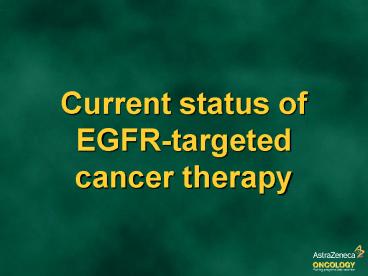Current status of EGFR-targeted cancer therapy - PowerPoint PPT Presentation
Title:
Current status of EGFR-targeted cancer therapy
Description:
... (IRESSA) observed responses at doses of 150 mg/day and above; however, the incidence and severity of adverse events increased with dose.2-5 Similar results ... – PowerPoint PPT presentation
Number of Views:34
Avg rating:3.0/5.0
Title: Current status of EGFR-targeted cancer therapy
1
Current status of EGFR-targeted cancer therapy
2
Potential treatment options for EGFR-targeted
therapies
Locally/ regionally advanced disease
Advanced/ metastatic disease
Pre-malignancy
Localized tumors
S
RT
CT RT
CT
EGFR-targeted therapy
S, Surgery RT, RadiotherapyCT,
Chemotherapy/hormone therapyEGFR, epidermal
growth factor receptor
3
From concept to clinical trials
- The concept
- Targeted therapy for a broad range of common
solid tumors (including lung, breast, prostate,
colon, ovarian, and gastric) - Clinical trials
- Proof of concept
- well-tolerated therapy
- tumor responses in several tumor types
- The potential
- Improved outcomes in the treatment of common
solid tumors
mAbs
TKIs
Tumor response
mAbs, monoclonal antibodies TKIs, tyrosine
kinase inhibitors
4
Clinical development of anticancer agents
Typical cytotoxicOBD gtMTD
Novel targeted agentsOBD ltMTD
Effect
Effect
Toxicity
Antitumor effect
Toxicity
Target
Target
Antitumor effect
Dose
Dose
MTD
OBD
OBD
MTD
OBD, optimal biologic dose MTD, maximum
tolerated doseRowinsky 2000
5
Clinical development of EGFR-targeted therapies
- Phase I trials failed to identify the MTD of
cetuximab the OBD was identified as the dose
that saturated the antibody systemic clearance
rate (200 mg/m2/week) - Gefitinib (IRESSA) Phase I trials did identify
the MTD (700-1000 mg/day), but also showed that
the OBD was 250 mg/day, as confirmed in Phase II
trials - Phase I trials of erlotinib identified the MTD as
150 mg/day this is the recommended dose
Baselga et al 2000 Baselga et al 2002 Herbst et
al 2002 Nakagawa et al 2003 Ranson et al 2002
Fukuoka et al 2003 Kris et al 2003 Hidalgo et
al 2001
6
Cetuximab approved for the treatment of advanced
colorectal cancer
Partial response rate, Disease control rate,
Median TTP, months Median survival, months
Combination(n218) 22.9 55.5 4.1 8.6
Monotherapy(n111) 10.8 32.4 1.5 6.9
p value 0.007 0.001 lt0.001 0.48
Cetuximab in combination with irinotecanTTP,
time to progression
Cunningham et al 2003
7
Gefitinib (250 mg/day) approved for the
treatment of advanced NSCLC
IDEAL 1(n103) 18.4 54.4 7.6 35 40.3
IDEAL 2(n102) 11.8 42.2 6.5 27 43.1
Response rate, Disease control rate,
Median survival, months 1-year survival,
Symptom improvement,
Assessed in 67 symptomatic patients in IDEAL 1
and 102 symptomatic patients in IDEAL 2
Fukuoka et al 2003 Kris et al 2003
8
Erlotinib awaiting approval for the treatment
of advanced NSCLC
Perez-Soler et al 2003
9
Other EGFR-targeted therapies under clinical
development
EMD72000
mAbs
h-R3
ABX-EGF
PKI-1066
TKIs
CI-1033
EKB-569
10
Summary of current EGFR-targeted treatment
options
- To date, two EGFR-targeted therapies have been
approved for the treatment of patients with
advanced or metastatic CRC (cetuximab) or NSCLC
(gefitinib) - Approval of erlotinib for the treatment of
advanced NSCLC is expected in 2004 - Several other EGFR-targeted therapies are
undergoing clinical development, with the
majority showing some activity in a range of
solid tumors

